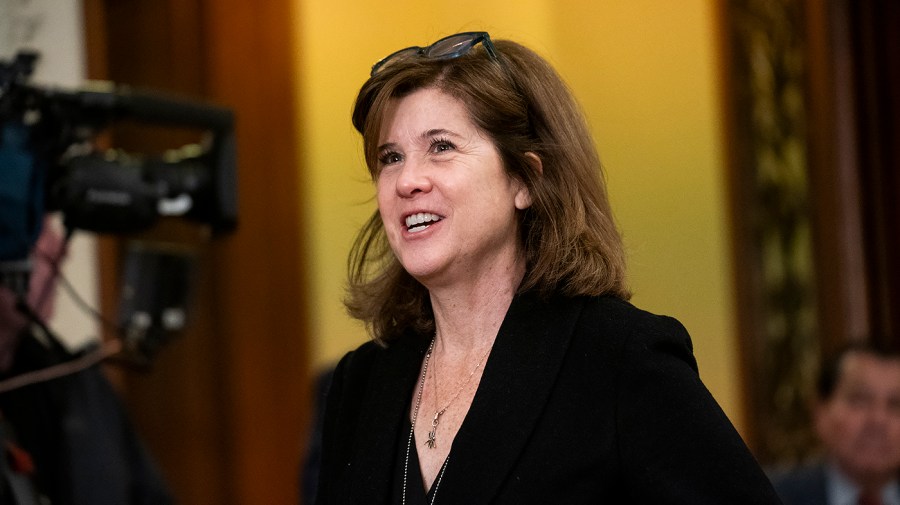Senate GOP must think ahead this time and remove the Senate parliamentarian now

During President Trump’s push for his “big, beautiful” budget bill, either a betrayal or a political blunder occurred as an unelected bureaucrat became the most powerful person in the U.S. Congress. Before we go any further with a new budget — a process that is already underway — that needs to change.
Trump campaigned with the message that federal engagement on the abortion issue should be cut back. Although I disagree given the life-and-death stakes, I admire his commitment to tackle hard issues. And few things are harder than cutting federal funding to Planned Parenthood.
In the U.S. House budget, pro-life leaders fought for abortion vendors to be cut from the nation’s health care for a period of 10 years — a historic legacy for Trump, Speaker Mike Johnson and the GOP. But the U.S. Senate dropped that ball by choosing to play by rules that others haven’t always followed, allowing an umpire into the political game who seems to be playing for the other team. As a consequence, the funding cutoff now lasts just one year.
When key Republican-backed provisions of the “One Big Beautiful Bill Act” were gutted in the Senate, the executioner was not one of the elected leaders charged with representing taxpayers. The person wielding the blade, rather, was an unelected, deep-state bureaucrat: U.S. Senate parliamentarian Elizabeth MacDonough.
The parliamentarian position was created in the 1930s as an advisory role to weigh in on the statutes and procedures guiding the legislative process. It was not created by the Founding Fathers to ensure a check on congressional decision-making, and it does not appear in the U.S. Constitution. In 2012, Democratic Senate Majority Leader Harry Reid, a notoriously shrewd political operator from Nevada, appointed MacDonough to what has too often been a nearly lifetime role.
Raised in the shadow of Washington, D.C., MacDonough has long-term ties to establishment politicians, receiving praise from Republican Senate legend Bob Dole and advising Democratic Vice President Al Gore on counting electoral votes after his election battle in Bush v. Gore.
But this is the core of the problem. The Senate parliamentarian is sometimes nothing but an enforcer of the status quo, the so-called “uniparty” or swamp. No law demands that the advice of the Senate parliamentarian must be obeyed. Parliamentarians serve at the pleasure of the Senate majority leader. The current leader, Sen. John Thune (R-S.D.), can fire this one at any time or simply ignore her ruling.
Historically speaking, that has happened before. In 1975, Republican Vice President Nelson Rockefeller stepped in to overrule the parliamentarian on a budget fight. In 2001, Majority Leader Trent Lott (R-Miss.) fired then-Senate Parliamentarian Robert Dove after he issued an interpretation of the rules that would have made it difficult, if not impossible, to pass President George W. Bush’s $1.35 trillion tax cut.
In 2013, MacDonough’s pal Harry Reid changed the rules to allow for cloture on Judicial nominations, as did Senate Majority Leader Mitch McConnell (R-Ky.) in 2017, to allow for cloture on Supreme Court nominations and to enact the Trump tax cuts. And during the Biden presidency, House Democrats sent a letter signed by almost every party member demanding Senate Majority Leader Chuck Schumer (D-N.Y.) overrule the parliamentarian on votes regarding immigration and minimum wage laws.
Even as recently as this year, Republicans, led by Thune himself, voted to go against the parliamentarian when they motioned to strip California of the ability to set its own emission standards. Overruling the parliamentarian’s advice was accomplished with a simple majority vote.
So why didn’t that happen here, when the Senate took up the House version of the funding bill?
During the fight over the bill, some Republican lawmakers highlighted the parliamentarian’s political intrusion. GOP Rep. Greg Steube of Florida said on X, “How is it that an unelected swamp bureaucrat, who was appointed by Harry Reid over a decade ago, gets to decide what can and cannot go in President Trump’s One Big Beautiful Bill?”
Alabama Republican Sen. Tommy Tuberville echoed the sentiment, posting: “This is a perfect example of why Americans hate THE SWAMP. Unelected bureaucrats think they know better than U.S. Congressmen who are elected BY THE PEOPLE. Her job is not to push a woke agenda. THE SENATE PARLIAMENTARIAN SHOULD BE FIRED ASAP.”
Good advice.
Strategically speaking, a one-year cutoff makes no sense. It sets Republicans up for a difficult midterm election, as an abortion debate will be in full swing when the cutoff ends on October 1 of the election year. My organization will score any attempt to add back spending for Planned Parenthood and all abortion vendors, but the pain of that process — if it repeats in one-year increments — will be self-inflicted.
If Republicans are serious about being a governing party and surviving the midterms, they must build a better team. Why is the parliamentarian still there if she has proven to be an obstacle to Trump’s platform? To paraphrase the president, many people are asking. Before we start this entire budgeting process again for fiscal 2027, Majority Leader Thune must replace MacDonough with a procedural adviser who doesn’t try to legislate.
If the Republicans fail to act now, they deserve a one-way ticket out of Washington in 2026 courtesy of the American people.
Kristan Hawkins is president of Students for Life of America and Students for Life Action. Subscribe to her podcast, “The Kristan Hawkins Show.”